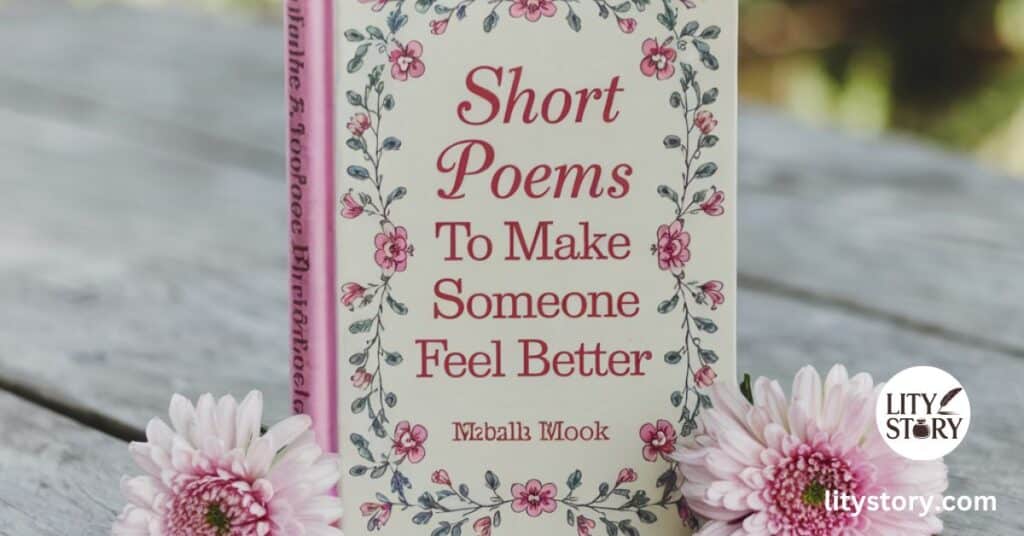Words possess an undeniable power to heal, uplift, and offer solace. When life feels overwhelming, short poems to make someone feel better often serve as a gentle remedy, delivering comfort in the most concise and meaningful way. Whether you’re dealing with personal struggles or wishing to help someone navigate their emotional challenges, poetry provides a sanctuary.
In this article, we’ll explore the profound healing power of words, uncover why short poems resonate so deeply, and delve into their transformative ability to inspire hope, resilience, and emotional well-being.
The Power of Short Poems

Short poems, despite their brevity, are deeply impactful. They strip away the superfluous and get straight to the heart of an emotion or idea. By condensing meaning into a few lines, short poems create a profound and immediate emotional resonance. This simplicity makes them accessible while leaving room for interpretation, allowing the reader to connect on a personal level.
Unlike long narratives, short poems often feel intimate, as if they’re whispering truths directly into your soul. Their versatility means they can convey both universal and deeply personal experiences, offering insight, encouragement, and comfort to anyone who reads them.
Poem Example:
“The weight you bear, it feels too much,
But strength blooms silent in your clutch.
Each trial faced, your roots grow deep,
Through stormy skies, your heart will keep.”
Why Short Poems Make Someone Feel Better
The essence of poetry lies in its ability to express emotions that words alone often fail to capture. When written thoughtfully, short poems provide healing and reassurance, making someone feel understood and supported. Here’s why they’re effective:
- They Offer Emotional Clarity: Poetry distills complex feelings into relatable and digestible forms, making it easier for readers to process their emotions.
- They Are Easy to Recall: A few impactful lines can stay with someone, offering comfort when they need it most.
- They Speak to Shared Experiences: Poetry often reminds us that we are not alone in our struggles.
- They Inspire Hope: By focusing on themes of resilience and healing, short poems encourage readers to see beyond their immediate hardships.
Poem Example:
“The sun may set, but stars will shine,
A constant light, your path align.
Through shadows thick and nights so long,
You’ll find your way, both brave and strong.”
Poetry as a Tool for Emotional Healing

The use of poetry as a therapeutic tool has been acknowledged for centuries. In moments of grief, stress, or anxiety, short poems serve as a vessel for emotional expression and release. They offer a safe space to confront feelings without fear of judgment.
When we read or write poems, we often gain a deeper understanding of our emotions. Words arranged rhythmically can break down barriers, helping us to articulate what we couldn’t otherwise say. This is especially true for individuals struggling with trauma or mental health challenges, as poetry allows them to process their experiences at their own pace.
Poem Example:
“Breathe in the calm, let chaos fade,
Through verses woven, peace is made.
The storm within begins to cease,
In whispered rhymes, find your release.”
Situations Where Short Poems Can Provide Comfort
Poetry’s adaptability makes it suitable for countless life situations. Below, we explore specific scenarios where short poems can be a source of healing and comfort:
1. Coping with Loss
When grieving, finding the right words can be challenging. Short poems help articulate feelings of sorrow while offering reassurance that healing is possible.
Poem Example:
“The love we shared, it lingers still,
Through quiet nights, it bends my will.
Though you are gone, your light remains,
A part of me, through joy and pains.”
2. Managing Stress
In a world filled with constant demands, short poems remind us to pause and reconnect with ourselves. They serve as small anchors of peace amid the chaos.
Poem Example:
“Pause and breathe, let worries go,
The river flows, yet we can slow.
Find stillness in the rushing stream,
Let gentle waves restore your dream.”
3. Offering Support to Friends
When someone we care about feels down, a heartfelt poem can remind them that they’re not alone.
Poem Example:
“When shadows fall and skies turn grey,
I’ll stand beside you, come what may.
Your path is tough, but you are strong,
Together, we will carry on.”
The Role of Imagery and Metaphors in Healing Poems

Imagery and metaphors are crucial in poetry. They engage the imagination, allowing readers to visualize concepts that resonate emotionally. By invoking nature, objects, or relatable scenarios, poems connect abstract feelings to tangible experiences.
For instance, comparing resilience to a tree that withstands storms can evoke a sense of enduring strength in the reader. Such metaphors make the message relatable and impactful, ensuring it lingers long after the poem is read.
Poem Example:
“A tree stands tall despite the gale,
Its branches bend, but roots prevail.
So too, your spirit weathers pain,
And rises strong to bloom again.”
Writing Short Poems for Emotional Support
Writing your own short poems can be an incredibly therapeutic exercise. It allows you to channel your emotions into art, offering clarity and emotional release. Here’s how to get started:
- Begin with a Feeling: Focus on the emotion you wish to express, whether it’s hope, sadness, or gratitude.
- Use Simple Language: Poetry doesn’t need to be complex to be meaningful. Choose words that are heartfelt and direct.
- Embrace Imagery: Paint vivid pictures that connect with your message.
- Keep It Short: Let the power of brevity shine. Aim for no more than four to six lines.
Poem Example:
“The mountain climbs, the ocean roars,
But hearts endure and love restores.
Through every trial, a lesson gleams,
Resilience flows, like endless streams.”
The Psychological Impact of Reading Poetry
Reading poetry has tangible psychological benefits. It activates areas of the brain associated with empathy and self-reflection, fostering a sense of connection and understanding. For individuals dealing with anxiety or depression, poetry offers a therapeutic outlet, shifting their focus from negative thoughts to empowering messages.
Poetry’s rhythmic nature also has a calming effect, similar to listening to music. It engages the brain in a way that encourages mindfulness, grounding readers in the present moment.
Poem Example:
“In rhythmic beats, the mind finds rest,
A gentle rhyme, a heart caressed.
Through every line, new hope takes flight,
A guiding star in the darkest night.”
Using Poetry for Daily Affirmations

Short poems can double as daily affirmations, reinforcing positive thoughts and building mental resilience. Incorporating these into your routine can help you start each day with clarity and optimism.
Poem Example:
“Today I rise, my strength intact,
Each step I take, no turning back.
The world may shift, yet I remain,
A beacon bright through joy and pain.”
The Legacy of Healing Through Poetry
The tradition of using poetry as a healing tool dates back centuries. From ancient civilizations to modern times, verses have been used to inspire, console, and empower. This enduring legacy highlights poetry’s ability to transcend boundaries, touching lives in profound ways.
Even in today’s digital age, the universal appeal of poetry endures. Its ability to capture emotions succinctly makes it an invaluable tool for navigating life’s complexities.
Poem Example:
“Through centuries, the words remain,
Their timeless power soothes the pain.
A gift of hearts, from then to now,
To heal, inspire, and show us how.”
Conclusion
Short poems hold the remarkable ability to make someone feel better, offering comfort, hope, and emotional clarity. Whether you’re reading them for solace or writing them to support someone else, their impact is undeniable. They encapsulate the profound healing power of words, demonstrating that even a few lines can change the course of a day—or a life.
Embrace poetry as both a reader and a writer. Let its transformative power guide you toward healing, resilience, and emotional well-being. Share these verses with those who need a touch of light, or create your own to continue this timeless tradition of healing through words.
FAQ’s
How can short poems help someone feel better?
Short poems offer comfort and reassurance with concise language. They provide emotional support, helping to uplift someone’s spirits during tough times.
Can reading or writing short poems improve mental health?
Yes, poetry can relieve stress and enhance emotional well-being. Writing and reading poems helps with self-expression and mental clarity.
What themes are best for short poems to uplift someone?
Themes of hope, resilience, healing, and encouragement work well. These themes offer motivation and remind readers of their inner strength.
How do short poems provide emotional support?
Short poems provide solace and comfort by expressing feelings that resonate with others. They help readers feel understood and less alone in their struggles.
Can short poems be used for self-care?
Absolutely! Writing and reading short poems is an act of self-care. They promote reflection, relaxation, and emotional healing, supporting overall well-being.

Litystoyr is the creative mind behind Litystory, a blog dedicated to helping readers navigate the complexities of canceling and activating various subscriptions. With clear, actionable advice, Litystoyr simplifies the process for users looking for easy solutions to subscription management and more.








